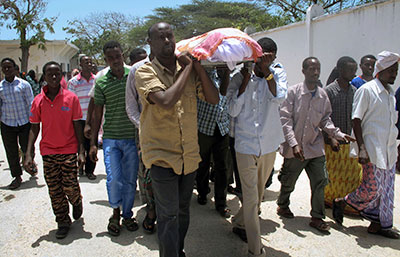In October, two gunmen shot Shabelle Media Network reporter Mohamed Mohamud as he left a mosque one evening; he died from the gunshot wounds less than one week later. Several members of the Somali armed forces who happened to be at the scene opened fire on his assailants, local journalists said, but Mohamed’s killers have still not been identified.
The same applies for the 12 Somali journalists killed in the direct line of duty CPJ has documented this year–the deadliest we have ever recorded. “All the killings had something in common: seeming impunity for the perpetrators,” writes the U.N.’s political head for Somalia, Augustine Mahiga, on his personal blog. “Although a few arrests were made by authorities, they seemingly never led to conviction and punishment.”
There is one sign of hope: Somali President Hassan Sheikh Mohamud recently said a task force would be set up under the guidance of Prime Minister Abdi Farah Shirdon to investigate all cases involving the killing of journalists. “The era of impunity must stop immediately,” the new president was quoted as saying in local reports. His announcement sparked some encouragement among local journalists, but the government is facing a tall order. Somalia ranks second on CPJ’s Impunity Index, which calculates unsolved journalist murders as a percentage of each country’s population; the threat of violence has forced scores of Somali journalists into exile.
So far, no crime committed against a Somali journalist has been properly investigated, local journalists tell me, except for one case whereby the African Union mission reprimanded a Burundi soldier accused of inadvertently killing a Malaysian cameraman, Noramfaizal Mohd, in September 2011.
Even with the Al-Shabaab insurgents ousted from the capital in August last year, the high rate of journalist murders has continued in Mogadishu –where two-thirds of all murders took place this year. This is perhaps one reason why it is challenging for authorities to capture attackers of journalists–their enemies are varied and many. Those who kill journalists are likely not only Islamic militants such as Al-Shabaab but also those within government and business circles where media revelations about corruption and bad governance are resented.
Most local journalists, however, identify Al-Shabaab as the main perpetrators. “One thing is for sure, journalists are soft targets for Al-Shabaab,” one local journalist told me. “Killing a journalist will earn an Al-Shabaab fighter credit with his commanders since they view all journalists as pro-government. Plus, killing a journalist ensures negative publicity that Al-Shabaab wants, to project Mogadishu as an unsafe place with weak leadership.” The fact that Al-Shabaab might target a journalist not necessarily for critical reporting but simply for being a member of the profession could explain why so many journalists are targeted and possibly why tracking down their perpetrators is so challenging. Journalists are often targeted without motive and witnesses are afraid to speak out in fear of reprisal, said former adviser to the prime minister and current director of the U.N.-backed Radio Bar Kulan, Abdirahman Osman. “This makes police investigative work very, very difficult,” Osman told me during a visit to Nairobi.
Poorly paid police and weak judicial institutions also hinder effective investigations and convictions of journalist murderers. Even though poor state institutions curtail investigations into the killings, several local journalists told me that it is largely corruption and complicity within law enforcement institutions that ensure total impunity; suspected criminals are released in exchange for bribes or information, these people said. Police Spokesman Abdullah Hassan Barise did not respond to CPJ’s requests for comment.
In the rare instances where suspected killers are caught, they tend to avoid prosecution and are not held for long. Police made several arrests linked to the December 2011 killing of veteran freelance journalist Abdisalan Sheikh Hassan and four suspects were apprehended in the killing of Radio Shabelle Director Hassan Osman “Fantastic” in January, local journalists told CPJ –but there were no prosecutions. In the case of Hassan Osman, his family spoke out claiming authorities had released the suspects for a small bribe and ignored evidence linking the murder to certain officials, according to news reports.
Few journalists with whom I spoke were encouraged when Police Spokesman Hassan Barise announced the capture, according to news reports, of four Al-Shabaab fighters suspected of killing journalists in late October. So far, none of the four suspects have been brought to court and when two local journalists attempted to follow up with the police spokesman…he hung up his phone, they said.
With such a poor record of justice, it would appear the self-perpetuating cycle of journalist murders is set to continue. As one young Mogadishu reporter told me over the phone: “If those who kill journalists know they can do it without any problems, what’s to stop further killings?”
In announcing, on November 9, the new task force, President Hassan Sheikh Mohamud said, “Impunity is unacceptable and we must determine who is behind these killings in order to bring them to justice. There should be no impunity and no excuses for not pursuing those perpetrators who are destroying the image and the reputation of Somalia.” The task force will be launched soon and seven people have been shortlisted for the position, local journalists said.
Mohamed Ibrahim, a New York Times correspondent and journalist union leader (although the leadership is currently contested) said he is encouraged by the president’s pledge. “We are hopeful that this investigative team will help identify the killers of the journalists since now perhaps killers of journalists will know that they may be brought to court. We are very hopeful that we can go forward and finally end this impunity.”
